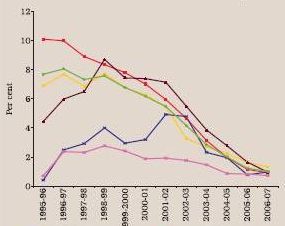Organizations today focus mostly on managing high performers, probably as a risk mitigation measure. After all, high-performers are considered as the drivers of business and their retention is a high priority for the organization. This blog, however, examines how to manage non-performers which may account for 10-20% of employee strength.
Who are non-performers ?
Are non-performers those who 
- » Do not meet their targets?
- » Do not contribute to the team effort?
- » Do not have the required skills & competencies?
- » Do not get along well their supervisors?
- » Take no action on the tasks assigned to them?
- » Spend no time on self-development?
- » Take no interest in the organizational activities?
- » Have a poor attendance record?
- » Are involved in disciplinary cases?
- » Are not interested in training and mentoring others?
- » Lodge maximum number of complaints and grievances?
- » Have below average performance rating over the years?
- » Have been repeatedly counseled to improve performance?
- » Are generally disliked by peers & seniors?
Perhaps most of the above aspects need to be examined before labeling an employee a ‘non performer’. This is possible only if you have composite on-line HR systems.
A few thoughts!
It is also important to look at the following aspects of your selection parameter to understand non performance in the organization:
You have always picked the right person for the right job
Your recruitment process was fair and you always searched for the best available talent
From your recruitment records you can verify the ratings of non-performers in the psychometric tests and their evaluations by interviewers.
You kept the new entrants on probation for a sufficient time
You had a proper system for induction & on-boarding
Your process does not allow the entry of sub-par performers in your organization
If these are all correct, then who created non-performers?
Through my interactions with many organizations for over 40 years I have identified the following as some areas of that may be responsible for non performance:
Problems with supervisors (i.e. reporting manager)
Lack of transparent and employee friendly HR policies
Absence of processes to implement and audit these policies
Absence of an holistic approach to label employees as ‘non-performers’
Focus on recognition and development of high potential employees only.
We saw why some employees fall into the ‘non performers’ category and how at times the selection process of the organization can be responsible for non performance. While it is important to identify why certain employees are branded as non performers, it is also important to be aware of how to manage them in such a way that they perform better. Here are some ideas to consider:
- Treat them as spoiled children: Parents seldom discard their non-performing children. They identify their strengths and provide the desired environment to nurture the same.
- Screen them through Assessment Centers: Behavioral experts should be engaged to identify the attitudinal attributes which marked them as non-performers.
- Collect 360 degree feedback: Use a formal survey and gather impressions about the acceptability in the environment of those labeled as non-performers. Inputs from peers and subordinates will provide a valuable picture. Design the feedback instruments carefully.
- Train your managers: To develop subordinates is an important role of all managers and they mat be equipped adequately to perform this role.
- Assign alternative roles: Transfer the non-performer to a new role, preferably in consultation with the employee.
- Consider them as company assets:
- They provide a real challenge both to HR and the respective line / functional managers, keep them on their toes and make them search for creative solutions.
- They provide continuity in their jobs.
- They are not over ambitious and thus do not compete with others.
- They provide stability to the organization and can be well utilized for routine jobs.
- Their experience and knowledge of the organization is valuable even if their performance ranks lowest.
- During phases of recession and consequent downsizing of the organization, they are readily available as a solution.
- Part ways if you have to: If you have tried everything else, don’t hesitate in parting ways. All employees may not be right for your organization and hiring mistakes are made often.
Empxtrack Professional Edition offers a solution to ‘Managing Non-Performers?’.
Empxtrack is an integrated web-based solution that meets all requirements connected with Employee Performance Management, Web-based Recruitment & on-boarding, a comprehensive Employee Database, Self Services and a variety of analytics and dashboards for effective decision making.









Thanks for sharing. It helps me to increase my knowledge.
Thanks for sharing It’s really informative for me.
Thanks for sharing its really informative for me.
Just liked this post on FB. Thanks for the fantastic read.
Managing performance is a classic problem among manager and organisation Goal, There is still allot of organisation which would like to take easy way out by facing out poor performer. The main issue is in term of job fit and job matching…….. At the point of hiring there need to be carefully mechanism of evaluation needed to be carried out to determine the suitability and ROI of hiring the candidate towards the company goal, mission and organisation Culture.
Unless a stone is turned treasure beneath is blur we should create oppurtunity to uplift the non performers
Very helpful and effective article..
Regards
Haris Iftikhar
Beneficial knowledge gratitude for expressing. The truth is in all articles and reviews of this site you will find things to learn.
That is certainly especially good stuff. Thanks a lot for your interest to give these sort of helpful information here.
Simply, Very useful & clear article..
Thanks
the article is simple and yet a great source of knowledge.
Human beings are complex and are not like computers. They have the potential to develop and change and can make a difference. Therefore, a non forming employee is not equivelant to zero talent.
.~’ I am very thankful to this topic because it really gives useful information .:*
Dear Mr B.K. Bhatia
Very good post and informative.It is very useful.Thanks for sharing such a fantastic thing
Regards
Shailaja
I never considered any of my representatives as a non-performer. I always try to dig in to the issue which turns out to be a will problem. Of course, we did the right choice of hiring them, so performance wise, they are good. There are many factors which may contribute to them being tagged as “non-performers” by others. With these factors, we may want to do a self-check. It could be us, their managers. It would definitely be better to call them as “most help needed”. You are correct, we have to spoil them.
there are professional career coaches out there that charges a small fee ‘,’
The tension between treating them as asset or as cost is well illustrated here. They are probably both. As suggested a long-term Quantitative assessment and short-term Qualitative assessment are both essential.
The way to treat non-performers seems to be quite effective and moreover getting feedback about the non-performers are good points. You have given enough space for non-performers to improve and that is a good quality.
Thanks for the post
Thanks, Chhavineet, for your comment.
I agree that the Manager has to periodically counsel the subordinates & guide them on how to improve. He needs to maintain the counseling notes & refer to the same during annual appraisal. These counseling notes should always remain visible to the employee. That is why you need on-line systems, especially to manage non-performers.
Manager should have vision to forsee his team memebers capability and performance level . He need to wok and change the behaviour of the low performer by cross questioning regularly, discussion etc. this practice one have to adopt on regular basis . Performance appraisal is exercise is yearly process to review the performance and reward the employee , but what i think is that manager should not depend on yearly performance but on quaterly review to develop all team members
nice post. thanks.
Warren, thanks for your comments.
I appreciate what you say & agree that the purpose of ‘Performance Appraisal’ is to make each employee climb to the next higher shade of performance & growth. And this can happen only if the reporting manager is not shy of giving an honest feed back, is capable of counseling the employee on how to improve and uses automated tools to manage the process as well as information.
Excellent post! A good perspective as well, especially in comparison to my recent post (Everyone Hates Performance Appraisals – What to Do?) which you can see at
I would like to add an observation about the very important group you did not mention — those that are neither high performers or low performers. This group forms the core of every company, yet is often overlooked for some of the same reasons low performers are not effectively managed.
In the end, the key to effective performance appraisal is regular, meaningful feedback which is constructive and honest, together with a system which facilitates managers and employees to have regular conversations with no surprises at year end.
In such a world, the non-performers would become stronger performers, or former employees, fairly quickly.
Warren
Hello Hiren,
Non-performers will always sit tightly glued to their chairs. They know their caliber & thus hesitate to shift out. If they transform their attitudes, each bus will carry them to the right place. I agree with you, however, that career counselors do have a role to play, especially for the freshers.
Although the root cause of non performance has to be determined first, it may happen that the non performer in one Industry may be a performer in some other function in another area. Jim collins has said in his book “Get the right people on the bus and wrong people off the bus”. It also implies help the wrong people in finding their right bus. Unfortunately the kind of career coaches that are there in the west are simply not there in India. My blog on the subject-Make your passion your profession
If there was a crumb on the table and you cut it in half, would you have two crumbs or two halves of a crumb?
Hello Mr Sergey Gorbatov,
Thanks for your comments.
Nothing wrong in following Jack Welch’s approach after you have segregated the ‘dead wood’ based on data compiled over the years. You can’t just throw out people on whims & fancies of managers. In fact, a better approach will be to first identify ‘dead wood’ amongst the managers. Others will get set automatically.
actually u couldnt cry under water because when you cry you inhale and exhale quite frequently wich would make you drown
Excellent Framing & bringing clarity…….showing the shiny other side of a coin…
Thanx a lot Sir..
Regards, Prakhar
What about Jack Welch’s approach? I agree – it might be a bit too tough, but companies (particularly big corporates) need to get rid of “dead wood” now and then with a clear message to the “solid citizens” and “shining stars”.
Manging Non perfromers :
3R Model Revive Revitalize and Rejuvenate
A good model is develop a focused program that has the blend of Training & Coaching and may be mentoring – all these non performers have a grouse they have been once best performers and now they have label NPs – consider how to remove this label
select a group and hold them It is more of undoing than doing some thing
V S Sudhaker
This is such a great resource that you are providing and you give it away for free. I enjoy seeing websites that understand the value of providing a prime resource for free. I truly loved reading your post. Thanks!